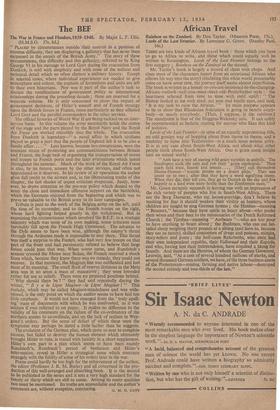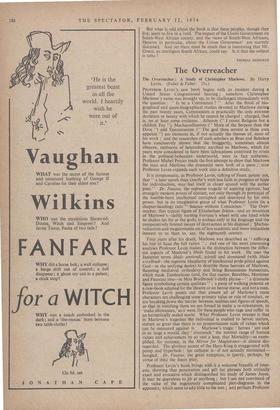THERE are two kinds of African travel book : those
which you have to go to Africa to write, and those which could equally well be written in Kensington. Lords of the Last Frontier belongs to the first category ; Rainbow on the Zambesi to the second.
Mr. Taylor's book is largely a record of chats with chaps. And since most of the characters (apart from an occasional African who elbows his way into the story) inhabiting this white world presumably come on leave some time, the journey itself seems almost superfluous. The book is written in a breezy so-you-are-interested-in-the-changing- African-outlook-well -you-must-meet -old-Pennyfeather style : the heartiness relieved from time to time with mild uplift : " The Bishop looked at me with tired, yet wise and kindly eyes, and said, ' It is my task to raise the African.' " Its main purpose appears to be to show that Rhodesian federation is going to benefit every- body—or nearly everybody. (That, I suppose, is the rainbow.) The standpoint is that of the Huggins-Welensky axis. It can safely be recommended as bedside reading for anyone who likes this kind of sedative.
Lords of the Last Frontier—in spite of an equally unpromising title, an odd gossipy way of hopping about from theme to theme, and a tendency to lapse into Technicolor—is a much more serious story. It is in any case about South-West Africa, not 'about what other people think about South-West Africa. One is given some insight into an actual world : "Ants haste a way of storing wild grain varieties in anthills. The Sandlopers stalk the ants and rob their grain cupboards.' They catch field mice, lizards and insects .... [They] call themselves Dauna-Daman—' seaside people on a desert plain.' They can count up to two ; after that they have a word signifying many. When they die, they tell you, they go to Damab in the sky and live happily in a land even more fertile than the Zessfontein oasis."
Mr. Green certainly succeeds in leaving one with an impression of the rich variety of peoples who live in South-West Africa. There are the Berg Damaras, who eat locust-porridge, don't believe in washing for fear it should weaken their virility as hunters, whose children are taught to sing German hymns ; the Himbas—meaning "Boasters," because they have cattle to boast about—who prefer their wives and their beer to the missionaries of the Dutch Reformed Church ; the Tjimbas—meaning " Antbears "—who are too poor to have anything to boast about ; the Bushmen, who can eat fat- tailed sheep weighing thirty pounds at a sitting (and have to, because they eat so rarely), skilled concoctors of drugs and poisons, mimics, story-tellers and poets ; the half-caste Rehoboths, who once had their own independent republic, their Volksraad and their Kapteln, and who, having lost their independence, have acquired a liking for brandy. And there are the Hereros, of whom the German Governor, Leutwin, said, "At a cost of several hundred millions of marks, and several thousand German soldiers, we have, of the three business assets of the Protectorate—mining, farming and native labour—destroyed the second entirely and two-thirds of the last."
But what is odd about the book is that these peoples, though they live, seem to live in a void. The impact of the Union Government on South-West African society, and the views of South-West Africans, Hereros in particular, about the Union Govemmen' are scarcely discussed. And yet there must be much that is interesting that Mr. Green, an intelligent South African, could say. Is it that the subject is tabu ?
THOMAS HODGKIN



































 Previous page
Previous page